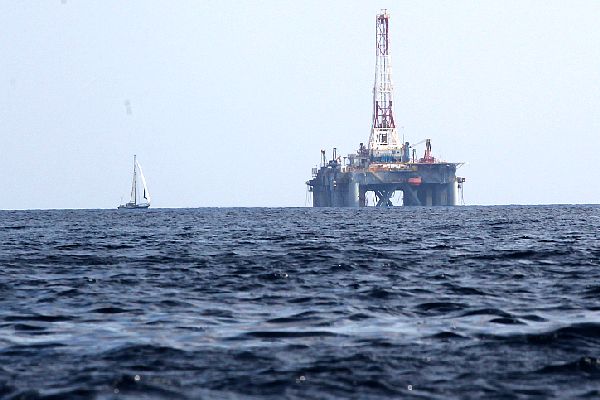Photo Credit: Nati Shohat / Flash 90

Energy Minister Yuval Steinitz on Monday approved Israeli exports of natural gas to Egypt from the Tamar and Leviathan natural gas fields, ahead of the expected completion of the Leviathan gas rig and first drilling at the rig planned for later this month.
The approval was granted after all “professional procedures for examining the subject” were completed, including permission from the Competition Authority and a consultation with the Concentration Committee, which recommended the proposed exports.
‘);
_avp.push({ tagid: article_top_ad_tagid, alias: ‘/’, type: ‘banner’, zid: ThisAdID, pid: 16, onscroll: 0 });
The gas exports from the Tamar and Leviathan gas reservoirs will be allocated both to domestic use in Egypt and exports of liquefied natural gas from Egypt to other parts of the world.
The government approved the export of a total of 60 billion cubic meters (bcm) of natural gas from Leviathan, and 25 bcm from Tamar over the next 15 years.
The expected amount of exported natural gas is valued at approximately $15 billion.
Steinitz said that his approval of Israeli gas exports marks the first time in the county’s history in which it is an energy exporter.
“A short time ago, I signed an approval for the export of natural gas from Israel to Egypt. In doing so, Israel becomes, for the first time in its history, an energy exporter and an important partner in the regional energy market,” he said.
“The export of gas to Egypt, from the Leviathan and Tamar reservoirs, is the most significant economic cooperation between Israel and Egypt since the peace agreement was signed between the countries. This is a historic milestone for the State of Israel. The natural gas revolution makes us an energy superpower and will enable not only huge revenues for the country, but also a dramatic reduction in air pollution,” he added.
Last week, Steinitz announced at the 25th UN Climate Change Conference in Madrid that by 2025, Israel would no longer use coal for electricity production. He cited the country’s massive natural gas reservoirs as the main alternative to coal.
The production of natural gas is expected to be a substantial source of revenue for the Israeli government, which is expected to earn NIS 17 billion in royalties from the gas discoveries. Additionally, the windfall profits levy is expected to reach up to 10 billion a year by 2040.
However, some have criticized the export of Israel’s natural gas to other countries, claiming it would undermine the country’s energy independence. Conversely, some have argued that more natural gas should have been exported and that the government could use the revenue for more sustainable, long-term investments.
Drilling at the Leviathan natural gas rig, which is expected to commence within weeks, has also been opposed for environmental reasons, with residents claiming that the placement of the gas rig close to the shore could potentially lead to an environmental catastrophe, if a leak should occur.
‘);
_avp.push({ tagid: article_top_ad_tagid, alias: ‘/’, type: ‘banner’, zid: ThisAdID, pid: 16, onscroll: 10 });



